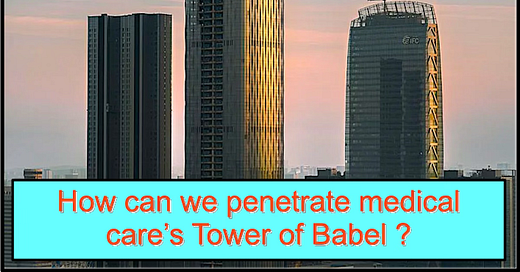The Scientific Tower of Babel
“I know of no more encouraging fact than the unquestionable ability of man to elevate his life by a conscious endeavor. It is glorious to paint the very atmosphere and medium through which we look, which morally we can do. To affect the quality of the day, that is the highest of arts.”
- HENRY DAVID THOREAU
Doctors are supposed to place the needs of the patient above all else. Patients are supposed to respect the doctors and take medical advice to heart. True healing requires a doctor-patient relationship based on mutual love, care, and concern. This healing relationship has more in common with family than with hard-nosed business practices. Today’s healthcare system delivers just the opposite.
What can we do about this? As in all other fields, practical applications come from theories. Medicine got into the present mess by holding to the wrong theory. We need a new theory – one that will return medicine to its ideals. But whether we like it or not, we are where we are. What drives the non-caring, bottom-line approach to medicine? How can we change it?
The Scientific Tower of Babel
Bringing ideals back to medicine is important, but why do we need a new theory to change things for the better? How did we get to this point in the first place? There are thousands of doctors, nurses, and medical scientists active in the world today; why do I see a need to offer a new theory of medicine?
Several reasons come to mind. One is poor communication among physicians and research personnel. Many brilliant people simply do not know what other brilliant people are studying. The same is true for their findings. How can this happen in our age of instant communication?
Many professionals specialize in areas that hold the most interest for them. A doctor may specialize in Neurology or Internal Medicine. It is the same with researchers. One scientist may specialize in studying the lung; another may focus on the kidneys. Specialization has advanced scientific knowledge, but it also causes communication problems.
Thousands of scientists publish hundreds of articles every month. Many professionals lack the time to follow the literature outside their field. The most educated person can accidentally suffer tunnel vision. This is the case in today's world. We have a scientific Tower of Babel: many people, trying to improve medical practice, completely fail to communicate with each other. Confusion resulting from this communication snarl is preventing progress.
Let us imagine that researchers discover pieces of a large jigsaw puzzle with each article they publish. If we widely separate the pieces of the final picture, they make little sense. When we place together two pieces from different fields, they may fit together in unexpected ways, teaching us more about the big picture. They may suggest unexpected or even surprising conclusions. This is why thinking across specialty lines often yields unique perspectives. Architect-Inventor-Polymath R. Buckminster Fuller described the solution to this problem:
“The only way we can get somewhere is by a completely different way of seeing our world: an informational approach. You pay no attention to sovereign boundaries – you transcend them. You have to get away from any ideas of specialization and develop your comprehensive literacy. It takes a long time to know anything that way, but once you do, you know it so clearly and cleanly that anybody who’ll sit down and work it out can’t go wrong.”
I have pursued Fuller's comprehensive literacy since 1970. This essay series – and the book Self-Referral/Maximum Health that is soon to be published - is a diligent effort to share the knowledge gained in the process. The result is a theory based on an eclectic collection of information. I also believe that it communicates clearly and cleanly what I have learned – and how all this can greatly improve medical care.
Another vital issue in improving healthcare is poor communication between medical researchers and the public. Scientists speak in precise, technical jargon. This language is often incomprehensible to the average person. The result is ongoing frustration or even anger between scientists and the lay public. Columnist Samuel Broder wrote in OMNI Magazine:
“Some researchers stop trying to make their scientific goals understandable to the public. This leads to frustration on all sides . . . We must find a way to speak a common language of science, to do all that we can to enhance communication between scientists and non-scientists.”
Many well-known scientific geniuses of recent history knew about the necessity of communicating well with others. The famous physicist Erwin Schrödinger offered: “If you cannot – in the long run – tell everyone what you have been doing, your doing has been worthless.” Physicist Albert Einstein stated, “Most of the fundamental ideas of science are essentially simple, and may . . . be expressed in a language comprehensible to everyone.”
In ongoing essays, we will explore how we can better come to grips with all this and more. Stay with me and we will explore these issues. Better understanding of the background helps us reach a useful remedy to the problems of today’s medical care.





